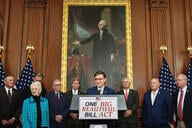You have /5 articles left.
Sign up for a free account or log in.
The Education Department released a series of proposed rules Wednesday that would simplify federal loans, to make it easier for students who attended fraudulent colleges or who are public service workers to get loan forgiveness.
The proposed rules include changes to the borrower-defense program and the Public Service Loan Forgiveness program, both which have been criticized for being overcomplicated and having lengthy application and review processes.
“This announcement is part of the administration’s continued commitment to making the student loan program work. They are the product of more than a year’s effort to seek input from the student aid community and robust proposals that will better serve students and hold institutions accountable,” said James Kvaal, the under secretary of education. “The proposals would also help prevent a future debt crisis by holding colleges and universities accountable for leaving students with outstanding debt and without good jobs.”
Supporters see the proposed changes as steps toward improving the overall student loan system to be more effective and affordable through targeted reforms.
“These look like the kind of policy changes we’d be supportive of,” said Jon Fansmith, the assistant vice president of government relations at the American Council on Education. “They may be smaller or lower profile than the things that often get talked about, but these kinds of changes are what help a lot of students, particularly those who are harmed by their experiences in higher education, find a path forward.”
Others, however, are critical of the department’s proposals to increase accountability of fraudulent colleges and believe the department is overstepping.
Jason Altmire, the president of Career Education Colleges and Universities, which represents the for-profit sector, said, “We think the department has greatly exceeded their authority in putting this type of proposal forward.”
The proposed regulations will undergo a 30-day comment period, and revisions to the proposal will be made before the Nov. 1 deadline. The earliest the new rules could take effect is July 1, 2023. Kvaal also said that later this summer an additional set of proposed rules will be announced that include “ensuring that student loan payments are affordable, that incarcerated individuals have access to Pell Grants for high-quality programs, that institutions are held accountable for inefficient private conduct, and creating processes for when colleges change owners.”
Borrower Defense
The department proposed a set of rules that would simplify borrower defense—the federal program that allows borrowers who have been defrauded or misled by a college to apply for student debt forgiveness. The new rules would set clear pathways for applicants through a single, “streamlined” application while also creating new accountability mechanisms to prevent such cases in the future by requiring colleges to recoup the costs of loan disbursements. These changes would apply to all future and pending borrower-defense claims as of July 1, 2023.
Additionally, when multiple claims of borrower defense are filed against the same college, these claims would be considered as a group, rather than on a case-by-case basis. The department most recently issued a group discharge to nearly 560,000 borrowers who attended the now-defunct Corinthian Colleges.
It would also create new, clear standards for misconduct by a college that could qualify a borrower for borrower defense, and a new category: aggressive and deceptive recruitment.
The for-profit sector, which generates the majority of borrower-defense claims, is unhappy with the proposed changes and argues that colleges are not given a fair chance to respond to claims of borrower defense in a way that ensures due process.
“This is a clear attempt by the department to weaponize the rule-making process specifically targeted at one sector of higher education,” said Altmire.
But Justin Draeger, the president of the National Association of Student Financial Aid Administrators, said that it is important that there is a rule “that balances the need for timely adjudication for borrower claims against schools that willfully misled students and then fairness in ensuring that schools have an opportunity to respond to those allegations.”
Under the proposed regulations, the Education Department would only engage in conversation with a college during a borrower-defense claim if they were trying to recoup money. The proposed regulations would also create a clear process through which the department can request that a college cover the costs of loan discharges for its former students.
Last week, the department announced a settlement that would cancel the debts of 200,000 borrowers who attended over a dozen colleges that were found by the department to have misled students about their programs.
Public Service Loan Forgiveness
The department also proposed changes to PSLF that would simplify the application process as well as create a process for the automatic tracking of eligible payments and reapplication.
The proposal clarifies the types of employees that qualify for PSLF, including a provision that would calculate qualifying hours for nontenured professors. The proposal would also create pathways for the department to automatically identify and begin tracking public employees’ progress towards PSLF, whenever possible.
The department did not state whether it was considering extending the PSLF waiver past the current Oct. 31 deadline. Some advocates are hoping for an early implementation of the proposed PSLF rule so that borrowers making payments on their student loans could count those payments toward PSLF.
Other Proposed Changes
The Education Department proposed other changes as well.
- Arbitration: The Education Department proposed to prohibit colleges from requiring borrowers to sign arbitration agreements, a common practice used by for-profit colleges during the admissions process that prevents borrowers from being able to participate in a lawsuit based on their borrower-defense claim. It would also establish a database within the department that would require colleges to disclose when arbitration agreements are used and when borrower-defense claims are filed against a college.
- Interest capitalization: The department proposed to eliminate interest capitalization, when unpaid interest is added to the principal amount of a student loan, from most federal student loan programs except those that require interest capitalization by statute. Interest capitalization causes a borrower’s loan balance to grow because future interest accumulates on a principal that has been inflated by the added interest.
- Total and permanent disability discharges: The proposed rules would establish new ways for borrowers who are totally or permanently disabled to receive loan discharges by broadening the scope of disability statuses and eliminating the three-year monitoring period that is used to track a borrower’s income after discharge.
- Closed-college discharges: Students who have outstanding federal student loan debt who attended colleges that closed would receive automatic forgiveness as long as they were enrolled within 180 days of the college’s closure and did not graduate under the proposed rule. This is an important change for students who attended colleges who closed but were not awarded degrees and left with outstanding debt.
- False certification: The proposed rules would create a streamlined process for borrowers who were not eligible for federal student loans, but were falsely certified by their college for federal student loans, to receive forgiveness.




